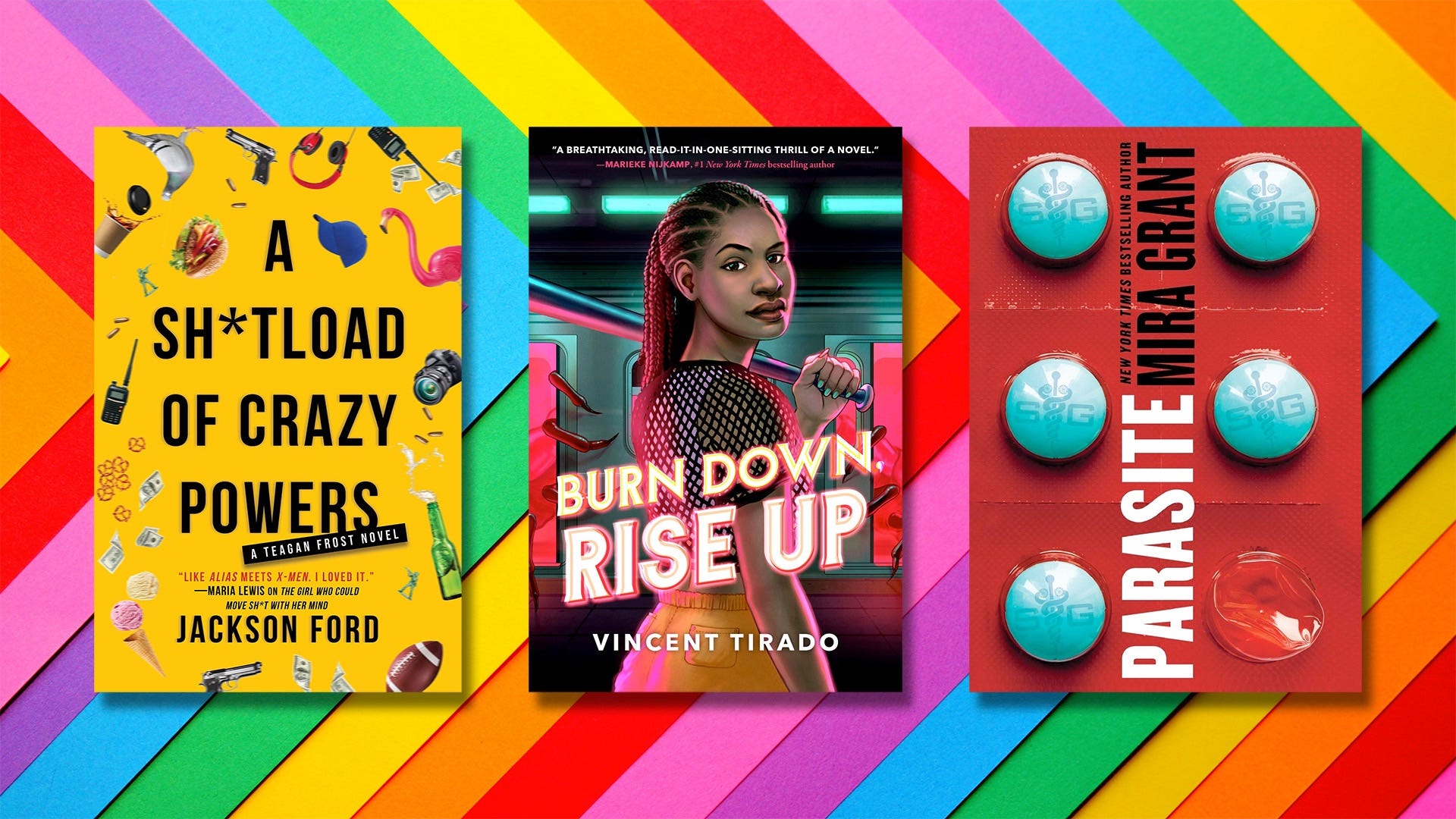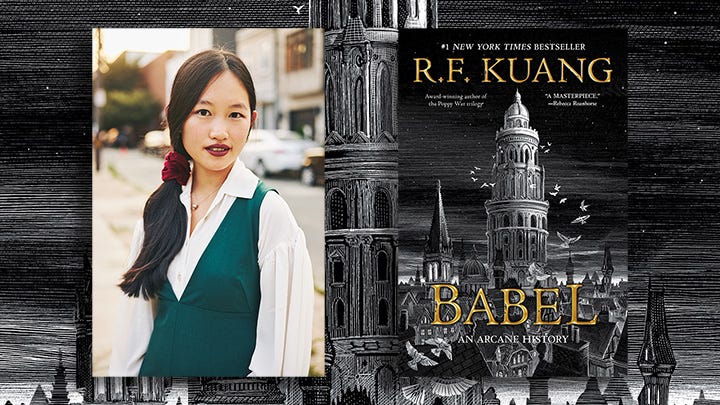Astrolabe 29: What’s in a (pen) name?
Jackson Ford? Mira Grant? Vincent Tirado? Meet the writers behind these pen names. Then join me for a couple of Babels.

“The manliest name I could think of.”
We all have a list of favourite authors whose books we’ll buy just because their name’s on the cover. For me, it’s Daniel Abraham, Sarah Gailey, P. Djeli Clark, and Erin Morgenstern (and, based on how much I’m enjoying Babel, probably R.F. Kuang, too.) For you, maybe it’s heavy hitters like Delilah Dawson or Seanan McGuire. But… what about your favourite author’s other names?
Pen names are a long literary tradition used by writers for a variety of reasons, so I invited some fine folk to explain why they use a pen name, the ways it affects their career, and how they settled on their new name.
Seanan McGuire (aka Mira Grant aka A. Deborah Baker)
My first book as Seanan McGuire (my real, given name, that I go by in daily life) was Rosemary and Rue, released in September 2009. It was an urban fantasy debut entering a crowded market at a time when people were ringing the funeral bells for the subgenre as a whole. At the same time, we were shopping Feed, a science fiction biological thriller about zombies. Every editor we approached asked if I'd be okay with a pseudonym. Why? Marketing, for one. Urban fantasy is often seen as a "girl's genre," and some readers will refuse to read it, or anything associated with it. Those are some of the same readers who make up much of the audience for zombie thrillers.
Sales, for another. Bookstores base orders off the sales of your previous book, and it was reasonable to assume my urban fantasy would under-perform. Acquiring editors wanted a win. So they asked if I'd be someone else. I said of course; it was a small price to pay to get my zombies out into the world. They weren't wrong, and thus, Mira Grant was born.
As to how I chose my second name, it's a complex and layered horror movie joke, and my second choice. My first, Samantha Grant, was deemed unworthy because I couldn't get the .com domain, and when you're making up a name, you may as well make up one that gets you the good virtual real estate.
Get Lost in the Moment and Found by Seanan McGuire
Rob Boffard (aka Jackson Ford)
My series The Frost Files was a very different style and genre to what I'd done before. My agent and publisher both suggested a pseudonym, to differentiate it from my Rob Boffard stuff. I hemmed and hawed, but agreed—my previous books hadn't set the world on fire, so maybe it was time for a fresh start. I picked Jackson Ford—Ford to honour my grandfather, who was once a radio DJ using the name Bob Ford, and Jackson because I liked the name.
We kept the Rob Boffard/Jackson Ford link secret at first—something else I was iffy about, but it really generated a lot of mystique when the book took off, and people tried to guess who Jackson Ford was. Things settled down after the reveal, about a year later. Long term, it hasn't had too much of an impact—it definitely helped rejuvenate my career a bit, which I'm grateful for, but I don't think my readers think about it all that much.
Get The Girl Who Could Move Sh*t with Her Mind by Jackson Ford
??? (aka. Vincent Tirado)
I use this specific pen name ‘Vincent Tirado’ for many reasons–it’s a call back to a college roommate’s OC that I really loved. I also love messing with gender expectations so when I go to book events in a dress and people expect to see a dude named ‘Vincent’, it’s always a balm to my soul.
However, the reason why I use a pen name in general is because I want a layer of anonymity. Yes, people will still know what I look like and a bit of my background, but I don’t want to be a public figure. (And also, I don’t want future employers or coworkers to know so much about my life just based on my name.)
Get Burn Down, Rise Up by Vincent Tirado
Deliliah S. Dawson (aka. Lila Bowen)
I always knew I wanted to write in multiple genres, so I assumed I would eventually be asked to take a pen name. I planned to start with my own name, because like all writers, I'm secretly a peacock, but I had several pen names ready for the day an editor sheepishly asked.
When we sold Wake of Vultures to Orbit, a division of Hachette, all of my previous books were with various imprints of Simon & Schuster. Wake of Vultures was quite different in tone and genre, and of course one publisher doesn't necessarily want to advertise for another publisher, so they asked if I would be comfortable with an open pen name. I readily agreed and suggested Dick Manly, which was the manliest name I could think of. [*snort laugh* -Ed.] When they asked me to maybe dial it back a bit, I decided on Lila Bowen. Lila, because if you shout it in a crowded room, I'll look up, and Bowen, an old family name that I've always liked. They liked it, too, so for four books, I became Lila Bowen.
Using a pen name for the Shadow series gave me that sweet Debut Boost, and the book did garner a bit of attention, including winning two RT awards and earning multiple starred reviews. I was never asked to keep the pen name secret, so I make sure to have it on all my social media and on my website and swag. I also made sure to develop a different signature for Lila, one that resembles a cattle brand, so I wouldn't accidentally sign the wrong name. Overall, I'm happy with my experience using a pen name and would be happy to use one in the future, if a publisher requested it. I would definitely go with initials next time, though, just to see if having a less feminine name would grab any new readers.
Get Wake of Vultures by Lila Bowen
When I opened my blog A Dribble of Ink in 2007, I purposefully avoided using a unique URL, instead using a /blog directory on my personal website. This was an intentional decision to start building a “brand” around my name, something I could develop over the years. (I’ve since switched to using a subdomain for Astrolabe, instead of a directory, but the intent is the same.) Is it the horrifying embodiment of the “personal brand” discourse that storms across social media twice a year? Yup. Did it work? I think so. It helped to connect my name with the work I’ve been doing for 15 years, and that’s helped maintain a certain level of consistent success even when I’ve been transitioning from thing to thing (it probably took 3-4 years for me to successfully transition from “blogger” to “writer” with my audience, for instance.)
But, that’s only one way of doing it. Speaking with the authors above, it’s fascinating to me to see how much goes into creating a name for yourself (sometimes literally), and nurturing the expectations that go along with that. I’ve always felt that maintaining a “personal brand” creates a layer of protection between my work life and my real life, just like Vincent Tirado describes.
One of the major things I’ve learned over that time, though, is there’s no right way to build a career. Everybody is different, and one writer’s approach won’t necessarily work for the others.
As I was working on this piece, I brainstormed writers I knew who used pen names, and very few of those that came to mind were cis-gendered white men—the demographic of creator most heavily favoured by the publishing industry. Rob Boffard, above, felt like an exception. I reached out to the writer community to find more people outside my bubble, and found more fascinating examples of how pen names can be used to benefit writers in a field as imbalanced as publishing—which tends heavily toward dudes like me.
Although I think we all agree that it would be better to live in a world where choosing a pen name is a choice for writers, rather than a necessity for many writers, the stories above showcase their versatility as a tool to protect, buoy, and define writers and the brand they build around themselves, their work, and their names.
Out & About
Out & About is where I highlight my work around the web—some recent and some old favourites.You know I love to talk about JRPGs, so I was thrilled to join at his incredible retro games newsletter, , for this chat about the genre, my book Fight, Magic, Items, and the wonderful legacy of Phantasy Star co-creator Rieko Kodama, who sadly passed away earlier this year.
MN: Was there any figure in the book you didn't know much about coming in who ended up surprising you with their role in genre history, with how much your own experience with JRPGs was intertwined with their catalog and influence without you being aware of their power over you?
AM: Oh, man, this is an easy answer: Rieko Kodama.
It's not that I didn't know of Kodama and her involvement in creating and nurturing the Phantasy Star series (Sega's answer to Dragon Quest and Final Fantasy), but I didn't know just how impactful her work on that series really was, or how much she influenced so many areas of not just Japanese RPGs, but representation in gaming period. When I started researching her work, I quickly realized I needed more of her story in the book, and ended up adding a full chapter devoted to her work and legacy.
Read the full interview:
And make sure you subscribe to so you don't miss the second part of the interview, which is coming soon!
Some more:
- 13 Cozy Video Games to Hibernate With This Winter (Lifehacker)
- Lost in Translation (Unwinnable)
- Podcast: Root and Branch, with Aidan Moher (Everybody’s Talking At Once)
LTTP—Metal Gear: Ghost Babel (2000, Game Boy Color)
LTTP (Late to the Party) is a regular column where I let Twitter decide which retro game I’ll play for an hour. Do your worst, Twitter!Thanks to 's recent coverage and Retronaut’s Metal Gear Solid Ranking Hootenany episode, I’ve been thinking a lot about Metal Gear Solid’s tremendous Game Boy Color outing: Ghost Babel.1 Two decades later, it remains a tremendous addition to the legendary series, and is right up there with Link's Awakening and Pokemon Crystal as the best Game Boy games of all time. Though I played it back near release, I thought it would be interesting to return to this party and look at the game through a modern lens.
Ghost Babel is, somewhat miraculously, the full Metal Gear Solid experience on the Game Boy Color. With Switch’s introduction of the home console/handheld hybrid model, and Steam’s impressive handheld gaming console, the SteamDeck, we’ve become used to the idea of meaty franchise games on the go, but back in the day they were a rarity. Like Link’s Awakening, Ghost Babel is a necessary retraction of its home console siblings, but unlike a lot of console-to-handheld transitions, it’s thoughtful and considered in how its takes the series’s trademark gameplay elements and adapts them for a portable experience. Instead of compromises and cutbacks, it feels like a polish experience from top-to-bottom, melding the strengths of the older 8-bit Metal Gear games (particularly Metal Gear 2: Solid Snake) with the larger changes the series adopted in its move to 3D.
During the earliest moments, Ghost Babel feels a lot like the original Metal Gear (NES), but this purposeful homage quickly reveals a game with a lot more complexity and depth than gamers were used to on the Game Boy. Impressively, rather than dividing the world up screen-by-screen, as even Link’s Awakening does outside of dungeons, the player’s viewport scrolls smoothly as they explore the game world. It makes the Ghost Babel feel larger and less compartmentalized than other games on the system—closer in kind to its 3D brethren. As I mentioned last issue, the Game Boy was around so long that developers were able to make incredible leaps as they mastered the technology. Ghost Babel is impressive not only for how it draws so much from the Game Boy Color’s limited tool set, but also for how it designs around those limitations without feeling like a lesser product. This is a worthy entry in the Metal Gear Solid series, placing well above some of its more technologically advanced—but critically flawed—descendants, and easily one of the best Game Boy games ever.
Metal Gear: Ghost Babel was released by Konami for the Game Boy Color in 2000. It has not been re-released on any other platforms.Recommended Reads—Babel by R.F. Kuang

I’ve been saving Babel for a rainy day. Despite not having read R.F. Kuang’s The Poppy War or its sequels, Babel was one of my most anticipated books of the year. Kuang’s personal background in academia and translation, coupled with the rave reviews of her debut fantasy trilogy, however, threatened to send my expectations for Babel —a standalone set in an alternate England where Silver working, “the art of manifesting the meaning lost in translation using enchanted silver bars,” has empowered the British Empire—to unfair heights. Happily, I can say Babel, a book I’ve been luxuriating in as summer sleeps and autumn gives way to winter, has not only met my expectations, but surpassed them in almost all ways.
I’d seen comparisons to Susanna Clarke’s modern classic Jonathan Strange & Mr. Norrell, so I was expecting something similarly dense and draining, but Babel is readable and fun, a page-turner despite its meticulousness, deeply serious and thoughtful despite its likeability. For a novel so ostensibly about academia and history, Kuang’s story is infused with character and personal conflict, giving real, human emotions to themes often written at larger, less personal scale. Babel is a gorgeous and thought provoking read that will leave you wondering anew about just how much you know about the language you speak daily. It might even inspire you to revolution.
Quest Markers
Quest Markers is a collection of the coolest stuff I’ve read around the web lately.- The Spectacular Life of Octavia Butler (Vulture)
- Liza Groen Trombi Asks Better Questions (Stone Soup)
- A Generation of Gamers Started Out Playing Barbie Fashion Designer (Harper’s Bazaar)
- How Gaming Magazines Shaped My Love of Gaming (Sidequest)
- The best science fiction and fantasy books of 2022 (Polygon)
- Finding myths and meaning in the lo-fi world of ‘Dwarf Fortress’ (Launcher)
- Everything Counts As Reading (Tor.com)
- 18 Canadian books to get the science fiction and fantasy fan this holiday season (CBC Books)
- TV Has Always Disappeared. This Feels Different. (Vulture)
- Everything but lost: Exploring the mesmerizing musical legacy of Outer Wilds (Game Developer)
- Pedro Eustache opens up about video game music and becoming the Flute Guy (The Verge)
- Growth, Play, and Starting Magic at 40 (Hipsters of the Coast)
- First Drafts, Genre, and Fictional Reality: A Conversation with Tad Williams (The Portalist)
- Madden '93 and immersive sim origins: the secret history of Ultima Underworld (Game Developer)
- The 500 Best Games of All Time (Polygon)
- In 2022, Picking a Game of the Year Is Ridiculous (Wired)
- Celebrate the 30th Anniversary of Star Trek: Deep Space Nine with The Dog of War (StarTrek.com)
- Break-ups, porn, and bakas: The legend of the Barnes & Noble manga section (Polygon)
End Step
Even video game creators use pen names—though not always by choice! Back in the ‘80s and ‘90s, many Japanese game developers/publishers wouldn’t credit staff with their full name, so Phantasy Star-creator Rieko Kodama went by the pen name Phoenix Rie.
What would your pen name be?
Support
There are lots of ways to support Astrolabe and my other work. Check ‘em out!
Keep In Touch
Enjoy Astrolabe? Want more SFF and retro gaming goodies? You can find me on Twitter and my website.
Credits
Astrolabe banner photo by Shot by Cerqueira on Unsplash
Confusingly, it was simply called Metal Gear Solid in the west, despite being an entirely new game. This Japanese subtitle slaps—so that’s what we’re going with. ↩


